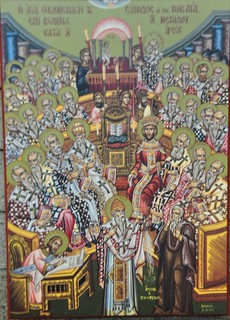Orthodox hymns for the Feast of the Ascension (Acts 1:1-12) mention a pain that the disciples of Christ feel at the Ascension. They are despondent and feel like orphans having lost their only parent. For example, from Vespers for the Ascension:
Lord, when Your Apostles saw You carried up upon the clouds,
they were filled with despondency, O Christ, Giver of life:
with wailing and tears they lamented and said:

“Master, do not leave us orphans,
Your servants whom through pity You have loved, as You are compassionate;
but, as You promised, send us Your all-holy Spirit to enlighten our souls!”
The Apostles had gone through the shock of losing their Master at the crucifixion, only to learn three days later that He is alive, risen from the dead! But now forty days after the resurrection, the emotional roller coaster plunges downward as the Risen Lord is taken from them at the Ascension and they are left to ponder what it all means.
When Jesus had said this, as they were watching, he was lifted up, and a cloud took him out of their sight. While he was going and they were gazing up toward heaven, suddenly two men in white robes stood by them. They said, “Men of Galilee, why do you stand looking up toward heaven? This Jesus, who has been taken up from you into heaven, will come in the same way as you saw him go into heaven.”
The angels were astonished at the bewilderment of the Apostles, but humanly speaking, the Apostles must have felt like Dorothy in the movie The Wizard of Oz: “My! People come and go so quickly here!”

For us Christians in the 21st Century, we too may find it difficult to find joy in the event in which Christ departs form us and leaves us here on earth to continue our mission amidst the daily problems we face in the world. Christ tried to prepare us for this reality as we can see in His words to His Apostles at the Last Supper as reported in John 14. Jesus says:
“Let not your hearts be troubled; believe in God, believe also in me. In my Father’s house are many rooms; if it were not so, would I have told you that I go to prepare a place for you? And when I go and prepare a place for you, I will come again and will take you to myself, that where I am you may be also.”
We can see immediately that Christ knew our hearts would be troubled by the events which were to unfold. But in talking to us about these things, He is saying to us that what will happen is according to the plan and will of God. The events will be troubling to us, but they not be unexpected. Jesus told us in advance what was going to happen so that we would not be caught off guard. He departs from the earth to prepare a place for us to live with Him. Thus, we are not waiting for something to happen, nor are we in a time when nothing is happening. Rather, Christ is doing what needs to be done for our salvation. If we believe He is good, then we trust that all that is happening now for us is necessary for our salvation. We are working out our salvation on earth while Christ prepares the place where we will join Him. We exist in time and so have to wait for time to pass, while Christ is working out our salvation in eternity. Eternity and time come together in Christ, but for us temporal beings we have to wait on the Lord, which can be agonizing for us.
Jesus said, “If you love me, you will keep my commandments. And I will pray the Father, and he will give you another Counselor, to be with you for ever, even the Spirit of truth, whom the world cannot receive, because it neither sees him nor knows him; you know him, for he dwells with you, and will be in you.”
If we love Christ, we will keep His commandments, now, here on earth, while He continues to prepare for us in heaven. Our task is not simply to wait, but to love Christ by keeping His Gospel commandments. We have been given our task, Christ is accomplishing what only He can do for us.

“He who has my commandments and keeps them, he it is who loves me; and he who loves me will be loved by my Father, and I will love him and manifest myself to him. . . . If a man loves me, he will keep my word, and my Father will love him, and we will come to him and make our home with him.”
A double blessing awaits us – Christ is preparing a place for us in heaven, and promises to make our home with us, with all those who love Him and do His word.
“These things I have spoken to you, while I am still with you. But the Counselor, the Holy Spirit, whom the Father will send in my name, he will teach you all things, and bring to your remembrance all that I have said to you. Peace I leave with you; my peace I give to you; not as the world gives do I give to you. Let not your hearts be troubled, neither let them be afraid.”
Christ understood we would be troubled by how things were going to unfold and are now unfolding. He loves us and so is concerned about our reaction to events. The Holy Spirit has been sent to us to teach us all we need to know in this world. The Holy Spirit will help us remember what we need to know to live in the here and now – for forgetting God is one of worst signs of the Fallen world (see for example Psalm 106). Christ gives us His peace to help us in times of trouble and fear.

“You heard me say to you, ‘I go away, and I will come to you.’ If you loved me, you would have rejoiced, because I go to the Father; for the Father is greater than I. And now I have told you before it takes place, so that when it does take place, you may believe.”
Christ acknowledges we will feel fear and sorrow in this world, and yet He says if we love Him, we should rejoice in his return to the Father. He doesn’t say we have to accept it or acquiesce to events we can’t control. We should rejoice that He goes to the Father for He ascended to heaven to prepare a place for us. It is necessary for us to experience this separation from Christ – for us to continue in this world while we await the coming of our Lord. We have to remind ourselfves– the current time on earth is necessary for our salvation as Christ fulfills His preparations for us. Our attitude is to be: This is the day which the Lord has made, let us rejoice and be glad in it. If we love Him, we will rejoice that He ascended for our salvation – to prepare that place for us. It is with this joy that we face the world and all the challenges it brings to us.


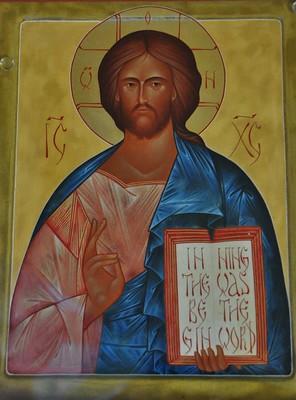



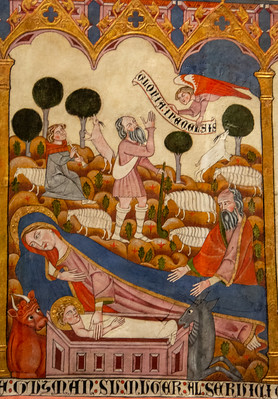
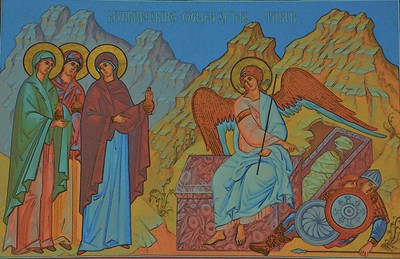

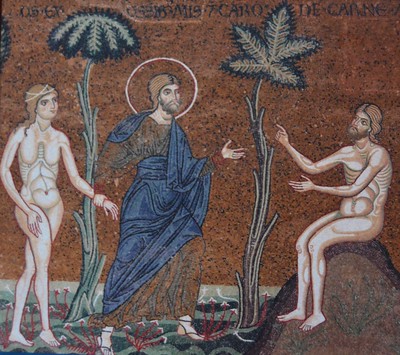









 In
In 


